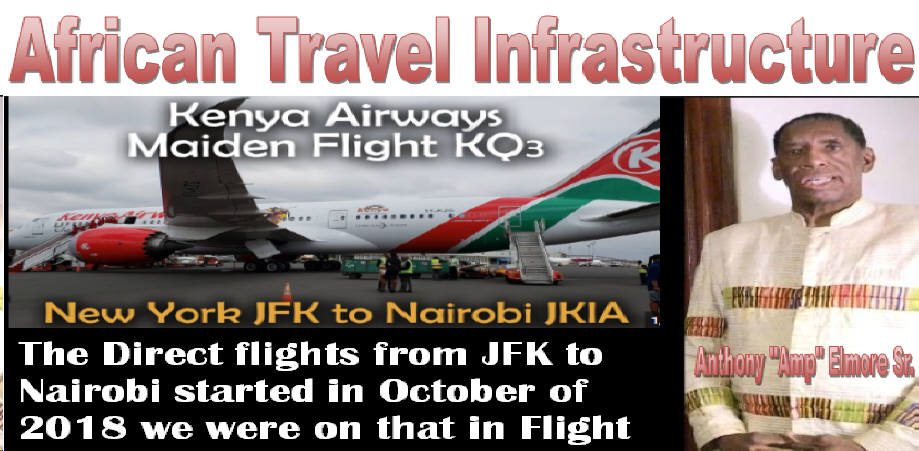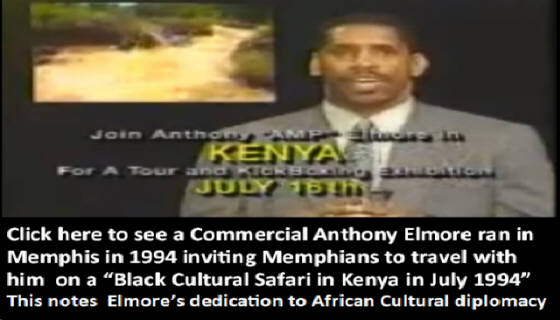
When it comes to travel to Africa, particularly Kenya, there is currently no “African Travel Infrastructure” to Kenya designed specifically for African Americans. Anthony “Amp” Elmore was the first person to bring African Americans on a safari to Kenya in1991. Elmore notes that their first trip to Kenya was in 1990 to premiere their 1988 film release, “The Contemporary Gladiator.”
During his 1991 trip to Kenya, Elmore made Memphis media appearances, purchased paid advertisements, and organized a Memphis “African Travel Club” to prepare for taking a group of African Americans to Kenya. With the help of Kenyan Thomas Mwangi, Elmore arranged comprehensive tours for a small, intimate group. They often joked that “the rarest animal on a Kenyan safari was an African American.”
When it comes to travel to Africa, particularly Kenya, there is currently no “African Travel Infrastructure” to Kenya designed specifically for African Americans. Anthony “Amp” Elmore was the first person to bring African Americans on a safari to Kenya in1991. Elmore notes that their first trip to Kenya was in 1990 to premiere their 1988 film release, “The Contemporary Gladiator.”
During his 1991 trip, Elmore made media appearances, purchased paid advertisements, and organized an “African Travel Club” to prepare for taking a group of African Americans to Kenya. With the help of Kenyan Thomas Mwangi, Elmore arranged comprehensive tours for a small, intimate group. They often joked that “the rarest animal on a Kenyan safari was an African American.”
In 1990, when they arrived in Kenya, Kenyans had never witnessed a group of African Americans. The warmth and welcome from Kenyans upon seeing Black Americans were overwhelming. Kenya has an amazing tourist infrastructure perfectly designed for White Americans who love nature and safaris. However, the consensus among African Americans was that they did not want to see another animal. African Americans have a low tolerance for safaris. Despite African Americans spending over $109 billion a year on leisure travel, with over $60 billion spent on international travel, Kenya does not market to Black Americans. In 2023, 210,000 Americans visited Kenya, but it is estimated that not even 1% were African Americans.
Our role in organizing the “Tom Mboya 70th and 1st Black Family Reunion in Africa” in Kisumu, Kenya, in August 2026, is to cooperate with Kenya’s Governor Peter Anyang’ Nyong’o to create an African American travel infrastructure. First and foremost, Kenya must realize the benefit of African American tourism. Kenya’s GDP is $107 billion, while African Americans spend $109 billion on leisure travel. African Americans travel in groups to cultural events more than any other ethnic group in America. However, Kenya is out of touch with this potential market and does not realize or value the potential of the “African American Dollars.” Many companies in America know the value of Black dollars and market to African Americans, but Kenya does not.
In 2008, President Barack Obama Jr., whose roots are in Kenya, was elected President. Despite this, Kenya does not have a robust African American Barack Obama tour. Barack Obama is the most popular American, yet Kenya does not take advantage of this. Anthony “Amp” Elmore, who created the Obama Heritage Tour, seeks to partner with Kenyan governors to create African American tours. Elmore is creating an African American travel infrastructure for African Americans, leveraging his relationship with Kisumu Governor Nyong’o. This infrastructure will facilitate Black Americans traveling to Kenya. In simple terms, a Black travel infrastructure means tours based on “Black culture.” America is not a monolithic country, and there is a specific market needed for Black Americans to travel to Kenya. Elmore is creating this “Black Travel Infrastructure.”
The start of a Black travel infrastructure is to announce plans in Kenya for Black travelers. The first step is to promote a “Black Cultural Event” to be held in Kenya. The event must be entertaining, educational, and enlightening. “The First Black Family Reunion in Africa” in Kisumu, Kenya, in 2026 meets this criterion. There are considerations like cost, time, and location. If one wanted to travel to Europe, it is easy, with bargains and tours already established. In Kenya, there are safari tours, but a dedicated infrastructure for African American travelers is still needed.
A dedicated infrastructure for African American travel to Africa, specifically to Kenya, is essential. Kisumu Governor Peter Anyang’ Nyong’o, an educator with a doctorate in political science, grew up under colonial rule and has firsthand experience of the Civil Rights struggle in America. His unique background makes him an ideal partner to support Anthony “Amp” Elmore’s vision of uniting Africans and African Americans. As the Governor of Kisumu City, Kenya, Nyong’o can play a pivotal role in facilitating and supporting the development of an African American travel infrastructure. This initiative aims to enable Black Americans to travel to Kenya for significant events, such as Tom Mboya’s 70th anniversary and the first Black Family Reunion in Kisumu City, scheduled for August 2026. This collaboration would not only honor historical ties but also strengthen cultural connections and promote mutual understanding between the two communities
